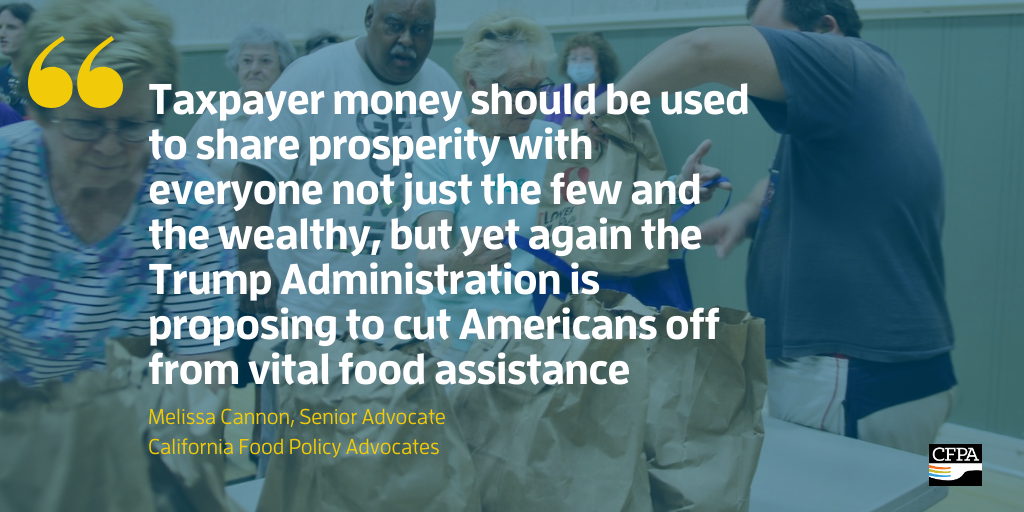Yesterday, President Trump released his Administration’s budget proposal for the next fiscal year. Included within the proposal were deep funding cuts that would increase poverty, widen income inequality, and take away basic food assistance for Americans of all ages. Read the joint statement from California Food Policy Advocates, the Western Center on Law and Poverty, and the California Association of Food Banks opposing the President’s proposal to cut core safety-net programs.link

Key takeaways from Trump’s budget proposal with respect to food security:
SNAP: The Trump Administration is proposing to cut funding for SNAP by $180 billion (nearly 30 percent) over the next ten years. The budget proposes to advance an ill-conceived and widely-ridiculed structural change to the program: giving Americans a stigmatizing monthly box of government-selected foods in lieu of benefits delivered on an EBT card. The assumption that the government can buy and provide food more efficiently than millions of American households is faulty and unrealistic. In addition, the Administration is seeking additional cuts through administrative rule changes that would together cut SNAP benefits for over three million Americans. Together, these proposals would have devastating impacts on California where an estimated two million households rely on the program. The time limit that already threatens basic food assistance to as many as 700,000 Californians would be extended to adults between 50-65 years old, an especially cruel provision that would spike hunger among older adults.
Child Nutrition: Under the Budget proposal, child nutrition programs are also on the chopping block. School meals would see a $1.7 billion reduction in spending over the next ten years under the Administration’s proposal. Large portions of this cut would come as a result of children losing eligibility for free or reduced-price school meals. The decrease in eligibility would result from changes to the process for verifying school meal applications and a reduction in the number of schools eligible to implement the Community Eligibility Provision (CEP). CEP is a critical tool for almost 3,000 of California’s high-poverty schools, enabling them to provide breakfast and lunch at no charge to all students. In addition to these cuts, the budget proposes to eliminate funding for the Nita M. Lowey 21st Century Community Learning Centers, which funds local afterschool and summer learning programs at an estimated 1000 school sites in California alone: the loss in funding would hurt access to after school suppers and snacks served in these programs.
WIC: The budget proposes funding WIC at $5.5 billion, a $500 million decrease from fiscal year 2020 levels. The Administration has justified the proposed cut based on declining caseload, but we know that these spending cuts harm California’s future WIC participants by leaving less funds on the table for outreach and innovation within the program.
Deep cuts to health care, housing, disability, TANF, and more: In addition to massive cuts to nutrition programs over the next ten years, the budget proposes large cuts to other critical programs that meet families’ basic needs, including among others large cuts to Medicaid funding, significant funding cuts to public housing and housing voucher programs, and a proposed $20 billion reduction in funding for the Temporary Assistance for Needy Families program which will directly harm families with children experiencing poverty. Together these deep funding cuts would increase poverty and make it harder for Californians to put food on the table.
What’s next in the budget process?
Congress has rejected the Administration’s harsh and ill-conceived proposals to cut funding for SNAP, school meals, and the wider safety net in the past, and we encourage them to do so again. In the months ahead, Congress will begin making their own spending decisions. CFPA is committed to engaging our state and national partners in pushing Congress to reject the Administration’s proposals to severely cut necessary assistance for low-income families and to advocate changes that create a better life for all Californians. Californians who work hard and play by the rules shouldn’t be left behind or punished when they fall on hard times.
Questions? Contact: Melissa Cannon at 209.200.8446 or visit https://nourishca.org/federal-advocacy/





